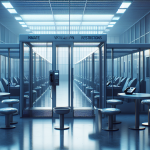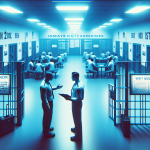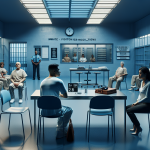The Denver Reception & Diagnostic Center is a correctional facility for inmates who require medical and psychiatric diagnostic evaluations. It’s important for family and friends of inmates to understand their visitation rights and how to visit inmates at this facility.
When visiting an inmate, one must first register on the Colorado state department’s website and pay a fee in order to be eligible for inmate visitation. The registration process can vary depending on the individual’s relationship to the incarcerated person. Once registered, visits usually take place on a set day and time designated by the facility.
In order to visit the inmate, all visitors must provide valid photo identification. All persons, including minors, must be registered and approved to visit by the facility. Upon arrival, visitors are subject to inspection and may be denied entry based on the Colorado State Department’s visitation regulations.
Those wishing to send items to inmates must adhere to the rules and regulations outlined by the state department and Denver Reception & Diagnostic Center. Certain items such as cash, electronics, and weapons cannot be sent. All sent items may be subject to iterable inspection by Denver officials.
The entire process of visiting an inmate is meant to be safe and controlled so that families of inmates can stay connected with the incarcerated person. After going through the initial registration process and following the rules outlined by Denver Reception & Diagnostic Center, family and friends can stay in touch and continue offering support.
Denver Reception & Diagnostic Center – Overview and Information
The Denver Reception & Diagnostic Center (DRDC) is an all-in-one detention center operated by the U.S. Immigration and Customs Enforcement (ICE) located in Aurora, Colorado. The facility encompasses two levels for the purpose of screening, housing, and providing medical care for individuals in immigration-related proceedings.
When construction was completed in 2001, DRDC was meant to be one of many short-term detention centers in the United States. However, the majority of individuals detained at DRDC remain in the facility for an extended period of time, with some even facing deportation.
The Department of Homeland Security (DHS) oversees all operations at DRDC. Given its status as a detention center, DRDC has stringent security measures in place to ensure the safety of both detainees and staff. All visitors are subject to a screening process before entering the facility.
DRDC is divided into two units: an intake unit and a medical unit. The intake unit is responsible for the initial processing and classification of all detainees upon their entry into the facility, while the medical unit provides comprehensive medical care and services to those in DRDC’s custody.
DRDC also offers various opportunities for detainees to participate in educational and recreational activities, including adult literacy classes, computer classes, and art classes. Furthermore, DRDC has established programs that allow detainees to voluntarily participate in community service projects.
DRDC has been criticized for its subpar living conditions, which can often be overcrowded and noisy. Furthermore, reports have suggested that detainees are not adequately informed of their rights while in detention. Nevertheless, DRDC is still often praised for its medical services that are offered to detainees.
Overall, DRDC is an integral part of the ICE network of detention centers and serves as a last stop for many individuals facing deportation before they are removed from the United States for immigration violations.
Denver Reception & Diagnostic Center – Classes, Services, and Programs
The Denver Reception & Diagnostic Center (DRDC) offers a variety of programs, services, and classes which provide care and rehabilitation to individuals in need. The center strives to provide a caring, supportive, and respectful environment for individuals with substance abuse, mental health, and criminal justice issues.
Services available at DRDC include individual and group therapy aimed at maintaining stability and helping individuals overcome their challenges. Services also include academic, vocational, and recreational activities. The center has a 24-hour crisis hotline to provide support and sympathy for people in distress. The DRDC team consists of experienced professionals, including behavioral health providers, nurses, counselors, and psychiatrists.
DRDC offers several classes and programs that aid individuals in reaching their highest level of functioning. Substance abuse and mental health programs are available and focus on helping individuals improve their physical and mental health. Other classes include anger management, life skills, resume building, job readiness, and parenting skills.
The DRDC also offers a variety of social activities such as sports, movies, and field trips. These activities are designed to create a sense of community and to help individuals form supportive relationships with their peers.
The DRDC is a valuable resource for individuals who are struggling with substance abuse, mental health, and criminal justice issues. Individuals can receive personalized treatment, access educational and social activities, and find support from caring professionals. Additionally, DRDC programs are designed to accommodate individuals with various backgrounds and abilities.
Inmate visiting application in Denver Reception & Diagnostic Center
In Denver Reception & Diagnostic Center, anyone wishing to visit an inmate will need to fill out an Inmate Visiting Application prior to being approved for the visit. The application requires the prospective visitor’s full name, address, phone number, date of birth, government ID, and driver’s license or state-issued picture ID. Specific details about how the visitor is related to the inmate must be provided and only certain forms of identification are accepted.
Visitor applications are available on the Denver Reception & Diagnostic Center website or may be requested from the visiting area of the facility. If you do not have a valid form of identification or an address, you may be eligible for a Notary Public visit. If so, the visitor must complete the Notary Public Application and provide a form of signature identification.
Visiting hours are Monday through Sunday from 8 A.M. to 3 P.M. and applicants must arrive at the center no later than 2:30 P.M. The visiting area is for approved visitors only and any inappropriate verbal and/or physical contact between an inmate and visitor is not allowed. When a visitor arrives at the facility, they must check in at the reception desk and present a valid photo ID.
Visitors must understand that all mail, packages, and incoming visits will be subject to search on request of any correctional officer and/or drug dogs. Additionally, visitors must also submit to a full search of their person, clothing, packages, parcels, or any items brought to the facility when they arrive.
All visitors should remember to dress appropriately, remain respectful, and practice the utmost patience. This will ensure the visit progresses smoothly and that all visitors feel safe and comfortable while in the facility.
Denver Reception & Diagnostic Center: Frequently Asked Questions and Answers
1. How do I get to Denver Reception & Diagnostic Center?
The Denver Reception & Diagnostic Center (DRDC) is located at 4490 Pontiac Street in Denver, Colorado. The center is accessible via the E line RTD light rail train or taking a bus from the Denver Metro area. The bus routes closest to DRDC are routes 65 and 71 and the nearest light rail station is located at 10th Avenue and Kalamath Street (0.9 miles away).
2. What is the purpose of the Denver Reception & Diagnostic Center?
The Denver Reception & Diagnostic Center is a detention center that houses people awaiting trial, those that are in the process of being deported from the U.S., and people who are incarcerated. The DRDC also provides inmate and detainee healthcare, mental health, and substance abuse treatment services.
3. Who runs the Denver Reception & Diagnostic Center?
The Denver Reception & Diagnostic Center is operated by the GEO Group, which is a private correctional and rehabilitation provider. It is also overseen by the Colorado Department of Corrections and Immigration and Customs Enforcement (ICE).
4. What services does the Denver Reception & Diagnostic Center provide?
The DRDC provides many services to those housed there. These include health care, mental health, and substance abuse treatment services. Depending on the individual’s needs, they may also receive physical and occupational therapy, access computers, and participate in recreation and sports activities.
5. How can I contact the Denver Reception & Diagnostic Center?
Visitors can contact the DRDC by phone at 303-830-1400. During normal business hours, visitors can also contact the DRDC in person at 4490 Pontiac Street. Additionally, visitors can also contact the DRDC through its website at www.geogroup.com/drdc.






